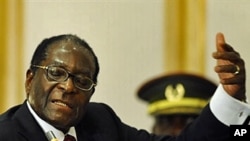Later this week, President Robert Mugabe's ZANU-PF holds its annual conference at which the party is expected to decide whether it will insist on fresh elections next year. Many prominent Zimbabweans believe elections will plunge the country back into violence and despair.
In October, Mugabe called for elections in 2011, saying Zimbabwe's unity government had been created as a transitional body and had served its purpose.
The September, 2008 political agreement does not set a time limit for the inclusive government but the next elections must be held before the end of March, 2013.
Now the aging president wants the ZANU-PF conference to endorse his call.
Many Zimbabweans, like veteran politician Paul Themba Nyathi, say Mugabe's advancing age has much to do with the 86-year-old's determination to hold elections next year. "The most difficult thing in the timing of this election is Mugabe's own personal circumstances. If he still wants to be a candidate for his political party he has to do it now. If he does it in three years' time he will be 89," he said.
University of Zimbabwe political scientist Eldred Masunungure also says Mugabe's age is spurring the drive for early elections. "ZANU-PF's biggest asset is Mugabe himself, and the laws of biology will take their course. Those who are planning early elections have that as one of the biggest factors so that the asset is there for elections," Masunungure said.
Simba Makoni was a teenage member of ZANU-PF during the liberation war and served in Mugabe's post-independence Cabinet. Frustrated with Mr. Mugabe and ZANU-PF he quit the party weeks before the 2008 elections and stood against his former boss and the president of the then-opposition Movement for Democratic Change, Morgan Tsvangirai.
Tsvangirai's party won the general election, but no clear winner emerged from the presidential poll, forcing a runoff between Mugabe and Tsvangirai.
There was widespread violence leading up to the runoff presidential poll and Tsvangirai withdrew, saying he could no longer allow Zimbabweans to pay such a heavy price. International human-rights organizations and governments such as the United States said most of the violence was perpetrated by Mugabe's supporters.
Makoni believes there are reasons beyond old age for Mugabe's determination to hang on to power. "There are lot of things that motivate Mugabe to stay where he is, but they all center around power, command, and control. Mugabe has enjoyed power for the last 30 years. I think it is fair to suggest that he also has fears of leaving office as he has a lot to account for and that is what drives him," Makoni said.
In terms of the 2008 political agreement from which the power-sharing unity government emerged in February 2009, Zimbabwe must adopt a new constitution before elections can be held. The agreement also stipulates that Zimbabweans must vote in a referendum to approve the new charter.
But even if all of that happens, Zimbabwe Congress of Trades Unions President Lovemore Matombo says he expects there will be even worse ZANU-PF sponsored violence than in 2008.
"Starting with the referendum, [there will be] a blood bath against those resisting ZANU-PF," Matombo said.
One of the senior military leaders of the liberation war, Dumiso Dabengwa, says his party, ZAPU, was crushed and thousands of its supporters massacred by Mugabe's North Korean trained troops in the 1980's.
He said violence is against the ideals he and his colleagues fought for during the liberation war that ended minority white rule. "We could not understand how anyone could get that desperate to start using violence to get rid of a political opponent," he said.
Analyst Masunungure says that for most Zimbabweans elections next year will not be about political choice. "So elections in 2011 in Zimbabwe will be a barometer of fear, not of who [people] would like to govern them," Masunungure said.
The secretary general of the minority MDC faction, Welshman Ncube, said the climate in Zimbabwe is far too fragile for elections next year. "If we indeed have elections next year it will be a national tragedy, we will be cursed. I have no doubt we will get to the position of Ivory Coast," Ncube said.
We attempted to obtain comment from several ZANU-PF officials, who, despite promises, were not available. In the past, Mugabe and his party have denied they use violence and intimidation against voters.




